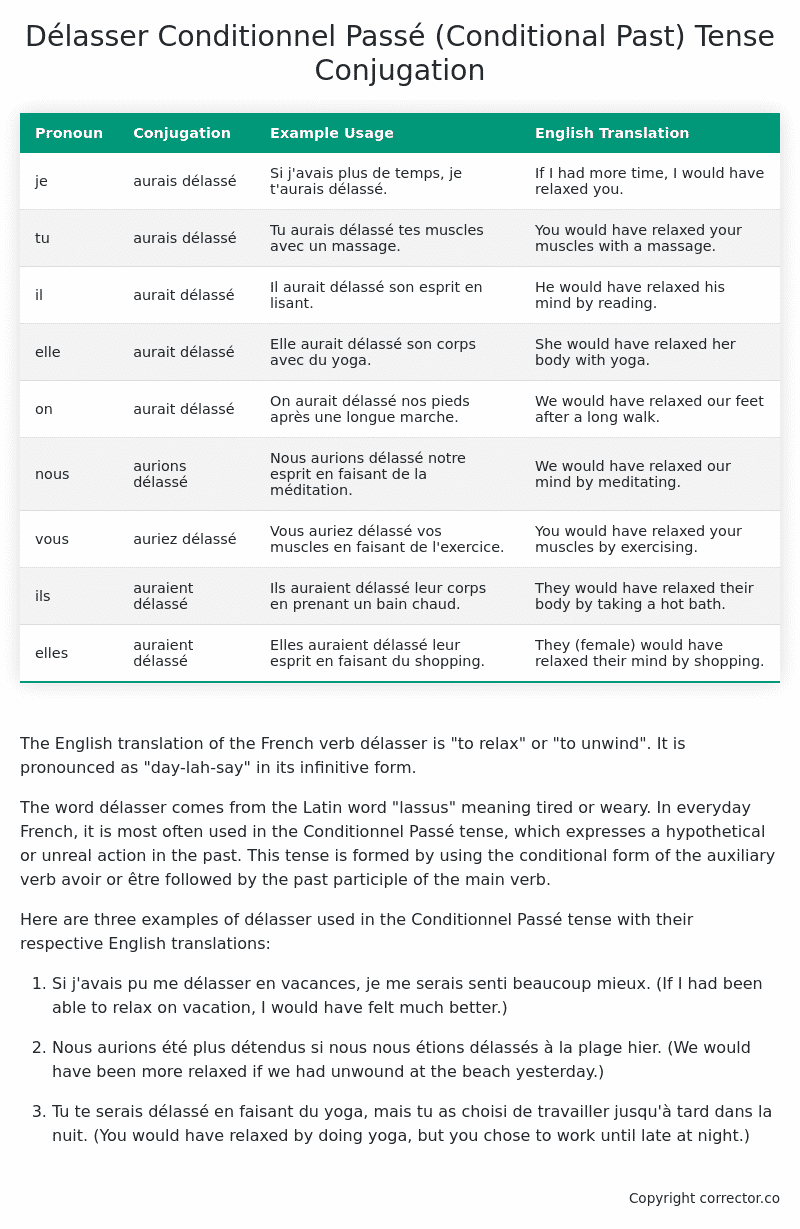Conditionnel Passé (Conditional Past) Tense Conjugation of the French Verb délasser
Introduction to the verb délasser
The English translation of the French verb délasser is “to relax” or “to unwind”. It is pronounced as “day-lah-say” in its infinitive form.
The word délasser comes from the Latin word “lassus” meaning tired or weary. In everyday French, it is most often used in the Conditionnel Passé tense, which expresses a hypothetical or unreal action in the past. This tense is formed by using the conditional form of the auxiliary verb avoir or être followed by the past participle of the main verb.
Here are three examples of délasser used in the Conditionnel Passé tense with their respective English translations:
-
Si j’avais pu me délasser en vacances, je me serais senti beaucoup mieux. (If I had been able to relax on vacation, I would have felt much better.)
-
Nous aurions été plus détendus si nous nous étions délassés à la plage hier. (We would have been more relaxed if we had unwound at the beach yesterday.)
-
Tu te serais délassé en faisant du yoga, mais tu as choisi de travailler jusqu’à tard dans la nuit. (You would have relaxed by doing yoga, but you chose to work until late at night.)
Table of the Conditionnel Passé (Conditional Past) Tense Conjugation of délasser
| Pronoun | Conjugation | Example Usage | English Translation |
|---|---|---|---|
| je | aurais délassé | Si j’avais plus de temps, je t’aurais délassé. | If I had more time, I would have relaxed you. |
| tu | aurais délassé | Tu aurais délassé tes muscles avec un massage. | You would have relaxed your muscles with a massage. |
| il | aurait délassé | Il aurait délassé son esprit en lisant. | He would have relaxed his mind by reading. |
| elle | aurait délassé | Elle aurait délassé son corps avec du yoga. | She would have relaxed her body with yoga. |
| on | aurait délassé | On aurait délassé nos pieds après une longue marche. | We would have relaxed our feet after a long walk. |
| nous | aurions délassé | Nous aurions délassé notre esprit en faisant de la méditation. | We would have relaxed our mind by meditating. |
| vous | auriez délassé | Vous auriez délassé vos muscles en faisant de l’exercice. | You would have relaxed your muscles by exercising. |
| ils | auraient délassé | Ils auraient délassé leur corps en prenant un bain chaud. | They would have relaxed their body by taking a hot bath. |
| elles | auraient délassé | Elles auraient délassé leur esprit en faisant du shopping. | They (female) would have relaxed their mind by shopping. |
Other Conjugations for Délasser.
Le Present (Present Tense) Conjugation of the French Verb délasser
Imparfait (Imperfect) Tense Conjugation of the French Verb délasser
Passé Simple (Simple Past) Tense Conjugation of the French Verb délasser
Passé Composé (Present Perfect) Tense Conjugation of the French Verb délasser
Futur Simple (Simple Future) Tense Conjugation of the French Verb délasser
Futur Proche (Near Future) Tense Conjugation of the French Verb délasser
Plus-que-parfait (Pluperfect) Tense Conjugation of the French Verb délasser
Passé Antérieur (Past Anterior) Tense Conjugation of the French Verb délasser
Futur Antérieur (Future Anterior) Tense Conjugation of the French Verb délasser
Subjonctif Présent (Subjunctive Present) Tense Conjugation of the French Verb délasser
Subjonctif Passé (Subjunctive Past) Tense Conjugation of the French Verb délasser
Subjonctif Imparfait (Subjunctive Imperfect) Tense Conjugation of the French Verb délasser
Subjonctif Plus-que-parfait (Subjunctive Pluperfect) Tense Conjugation of the French Verb délasser
Conditionnel Présent (Conditional Present) Tense Conjugation of the French Verb délasser
Conditionnel Passé (Conditional Past) Tense Conjugation of the French Verb délasser (this article)
L’impératif Présent (Imperative Present) Tense Conjugation of the French Verb délasser
L’infinitif Présent (Infinitive Present) Tense Conjugation of the French Verb délasser
Struggling with French verbs or the language in general? Why not use our free French Grammar Checker – no registration required!
Get a FREE Download Study Sheet of this Conjugation 🔥
Simply right click the image below, click “save image” and get your free reference for the délasser Conditionnel Passé tense conjugation!

Délasser – About the French Conditionnel Passé (Conditional Past) Tense
Formation
Common Everyday Usage Patterns
Expressing Unreal Past Scenarios
Polite Requests or Suggestions
Expressing Doubt or Uncertainty
Interactions with Other Tenses
Conditional Present
Indicative Past Tenses
Conditional Future
Summary
Want More?
I hope you enjoyed this article on the verb délasser. Still in a learning mood? Check out another TOTALLY random French verb conjugation!


